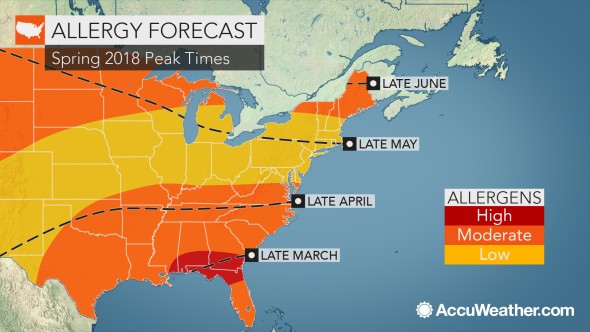Spring is upon us and with it comes another peak period of allergic-fueled suffering for most people. After a winter season with high levels of moisture from rain or snow, trees and grass are supplied with more than enough water to mass produce pollen throughout the country. While the warmer weather is a treat, it also works as a motivator for the release of pollen and other allergens into the air.
As a result, symptoms like sneezing, coughing, itchy eyes, and congestion can make enjoying the seasonal change more of a chore than anything. Unfortunately for those who tend to suffer through the annual attack of pollen, this year's forecast is a lot less forgiving than the last.

Keeping your allergies at bay
There are a number of ways to reduce the impact that pollen can have on you. All it takes is some planning and an understanding of what causes its effects to intensify.
- Know the peak times of pollen count: Typically, the morning is rife with higher pollen counts than the rest of the day, so limiting the time you spend outside between the hours of 5 AM and 10 AM can reduce its impact. In terms of weather, dry and windy days will cause allergies to flare up, while heavy rains can help to remove the pollen from the air and offer our sinuses a reprieve. Be sure to routinely check the pollen count forecast in order to properly prepare for the day.
- Make sure the air you breathe is fresh: This might seem difficult at first, but there are a number of ways to limit exposure to concentrated allergens when inside. If you’re at your home or work, then air conditioning can help to freshen up the air. Cabin air filter replacements in your car also go a long way to making your daily drive much more bearable. Those who require more advanced measures are recommended by the Mayo Clinic to use a portable high-efficiency particulate air (HEPA) filter in the bedroom.
- Stock up on allergy relief remedies: The most immediate short-term solution for pollen troubles is to keep an inventory of antihistamines, nasal spray, decongestants, and other over-the-counter medications to attack the symptoms as they occur. Even if you strive to ensure that you’re avoiding any allergens, this last line of defense is sure to come in handy when you need it most.
- Fight back against pollen on your car: If you have to commute to work, then you will be exposed to built-up pollen on your car multiple times per day. By keeping the exterior of your vehicle clean of pollen on a routine basis, you can reduce your typical exposure to it while also shielding your clothes from getting covered in yellow stuff.
After your car has been washed and rinsed clean, then there is no better time to protect your vehicle with an exterior detail. Our new Diamond Plate® Detail at Spiffy utilizes a nano ceramic polymer coating so effective it forms a second clear coat on top of your vehicle’s paint. It’s guaranteed to protect your paint from environmental damage, such as pollen, acid rain, hard water spots, and UV rays, and it comes with a 2-year warranty. If you’re ready to bring the fight back to pollen this season, then consider a Diamond Plate® Detail to be the ultimate protection for your vehicle.
If you're looking to give Spiffy a try for the first time, then be sure to claim $20 off your initial service!
Posted in Car Care





